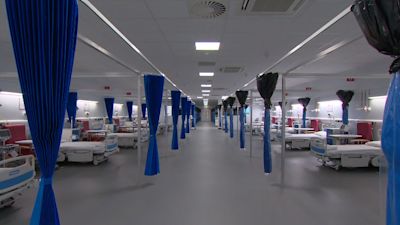Exeter's temporary Nightingale Hospital to stay open for another two years

Permission has been granted for Exeter's temporary £23million 116-bed Nightingale Hospital to continue operating from its current site for another two years.
Planners at Exeter City Council have approved plans to extend its lifespan and enable the building of new modular buildings for diagnostics - such as X-rays and MRI scans.
The aim is to reduce lengthy waiting lists that have arisen from the Covid-19 health crisis and the cancellation of non-critical appointments.
The site at Osprey Road in Sowton Industrial Estate was previously occupied by Homebase until September 2018.
Two years later, in September 2020, the Royal Devon And Exeter NHS Foundation Trust was granted permission for the temporary change of use to a field hospital until the end of October 2022.
That permission has now been extended for a further 12 months and will end on 31 October 2023.
The building's original purpose was to provide large-scale critical care for a temporary 24-month period.
In addition to the main hospital building, modular buildings were erected within the site around the hospital building to house other necessary facilities, including the hospital reception, pharmacy, kitchen space, changing rooms, lockers, showers and other facilities.
Although the hospital was initially built to provide temporary large scale critical Covid care, more recently it has been used for infusions and diagnostics to cover acute service backlog and extensive waiting lists as a result of the coronavirus pandemic.
The planning application states: "In addition to the healthcare use of the existing building and modular units already in place, modular buildings are proposed to be erected to the south of the site, including four larger modular buildings which will provide operating theatre, storage and recovery space.
"A number of smaller modular units are proposed to be constructed, providing additional W/C, shower, office and circulation space and linkages between the existing and proposed modular units. In addition, new MRI/CT scanners are proposed to be installed to the southwest of the site.
"A number of modular units erected in association with the Nightingale Hospital use are proposed to be repurposed to provide a new main entrance, reception and waiting facility for diagnostics, endoscopy and rheumatology."
The report concludes: "It seeks to enhance existing vital hospitals services to the wider population (social) of the south west of England, providing hospital space and largescale critical care to assist with reducing waiting lists for healthcare that have arisen from the Covid-19 health crisis and the associated cancellation of non-critical appointments.
"It should be considered that this proposal can deliver a great public benefit and as such request that the Local Planning Authority support this application."
Exeter's Nightingale opened on July 6, 2020, and is run by the Royal Devon and Exeter NHS Foundation Trust (RD&E). Due to low numbers of coronavirus in the region it was instead utilised for diagnostic testing, in particular cancer, as well as reducing hospital backlogs in the area, and for training overseas nurses.
In response to the increasing number of patients with Covid-19, and high demand for urgent care for non-Covid patients across Devon’s hospitals, it began to be used for its intended purpose for Covid inpatients from November 26, 2020.
Between November 2020 and March 2021, the NHS Nightingale Hospital Exeter cared for nearly 250 patients from across Devon, Somerset and Dorset.
Its largest number of patients peaked at 60 on 30 January, and 1 February 2021. Its last Covid-19 patient was discharged on 26 February, and the facility then resumed diagnostic testing again.
Out of the seven Nightingale hospitals that were set up in England in spring 2020 to help the NHS cope with a surge in coronavirus cases, four closed for good in April 2021.
The three remaining Nightingales - Exeter, London and Sunderland - were kept either as extra NHS capacity for routine work or as Covid vaccine centres.
Earlier this month, further plans were announced for it to be used a pop-up diagnostic centre where people can get NHS tests and scans.